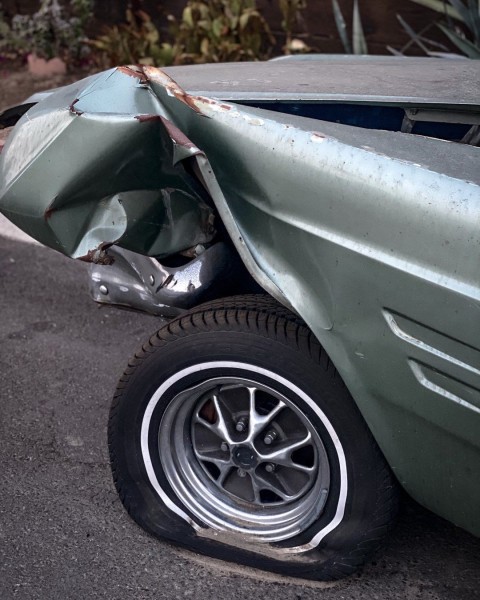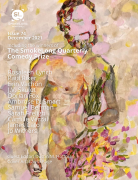Your father insists that you pray daily to Henry Ford, the patron saint of Michigan who puts steak on the table and keeps sneakers on your feet, but you’re not willing to die for him. It’s all because of Henry Ford and his automobiles that the Cubans are pointing their missiles at Detroit right now, according to your geography teacher. The Cubans will aim their bombs right here, she says, jabbing at the wall map of Michigan, its vulnerable thumb. They’ll shoot them at the Ambassador Bridge and Tiger Stadium and at the beating steel heart of the River Rouge Ford plant, and blast it all into a pile of dust.
You decide you don’t want to die without doing it, though you’re not clear on what it is. You suspect it has something to do with boys and what Donald Spatts does to you in the AV room. Donald Spatts has palms like swamps and too much spit in his mouth, but you let him press you up against the shelves of filmstrips and slide his tongue between your teeth. Afterward he cracks his knuckles and says, boy, what he’d like to do to those Commies.
Years from now, Donald Spatts will die in Vietnam, in a village that’s not on any map. His twelfth-grade face will smile out forever from the trophy case in the high school lobby.
You are riding on top of a snow-white 1967 Impala convertible, waving to the nearly empty street as if twisting a light bulb. Your driver, a guy from the dealership, has patent leather hair and sneers when you decline his offer of a cigarette. You suspect he would rather be driving Delores Hiser (“Best Body”), who thinks a bachelor’s degree is something a college awards to unmarried men, or Betsy Gilchrist (“Most Fun on a Date”). Your driver is not impressed that you were voted Most Likely to Succeed. This is apparent from the way he brakes too suddenly and corners too fast, forcing you to plant the tips of your imitation satin slippers into the crevice of the seat so you don’t roll over like the Titanic while you wave and smile.
You do it for the first time in the backseat of your ’70 Mustang, a graduation present from your father. You’re nineteen, it’s time. You do it with a French-Canadian hockey player who likes to caress your chrome bumpers with hands the size of shovels. You like how his hands spread you across the buttery leather of the backseat.
Except for puck and hello, he speaks no English, which is fine. You like to drive in silence.
You fall for a man who names his cars after Greek gods and croons Sinatra tunes while he paste-waxes their bodies. Like you, he loves driving anywhere and nowhere. You study maps at backroads gas stations while he shows off his ’66 GTO to the mechanics that migrate like Crusaders to the car. While they worship at the altar of the engine, you follow blue highways with your forefinger, tracing the route you’ll never take to Mexico.
Your husband whistles as he folds you into his Corvette and tells you to hold on for the ride of your life. At the hospital, you’re wheeled into a dark room, away from your husband, your unindicted co-conspirator.
Headlights are shined into your eyes, a semi rolls over your stomach. While you push out a human, your husband hands out cigars and swaps car stories with two other men in the waiting room.
You’re no longer a sports car but a utility vehicle whose body is chipped and dinged. You have gray roots and frown lines and ten pounds that won’t go away. Your best friend is your hairstylist who calls you honey and girlfriend and has sworn a blood oath to tell you whenever you have chin hair.
Your daughter endures you. She slumps in the passenger seat, refusing to speak. The pediatrician tells you not to worry, it’s a phase she’ll grow out of. She’d rather drive with her father who lets her steer and never says no.
Your husband no longer goes to the barber, but meets weekly with his stylist, a woman who shellacs his hair into an aerodynamic fin that hides his bald spot. Your husband stands in the mirror, studying his stomach. He begins to wear cologne. You begin to snoop. You find a copy of The Kama Sutra for Dummies in his briefcase, “from your little Mercedes with beaucoup love.”
You understand completely. Your husband has always wanted a Mercedes, now he’s found himself a good used one.
Your car dies on a dark night, on a road with no cell service, so you must walk. Your shoes pinch and your right ankle cracks, but the air is sweet with hickory smoke and roses. Maybe you’ll invest in some comfortable shoes and an iPod, teach yourself French in fifteen easy lessons. Maybe you’ll walk across France. Maybe you’ll learn to say non.
Maybe, maybe, maybe you sing as you walk. Not away anymore, but toward something you sense is there.
Henry Ford est mort. Vive Henry Ford



 The core workshop of SmokeLong Fitness is all in writing, so you can take part from anywhere at anytime. We are excited about creating a supportive, consistent and structured environment for flash writers to work on their craft in a community. We are thrilled and proud to say that our workshop participants have won, placed, or been listed in every major flash competition. Community works.
The core workshop of SmokeLong Fitness is all in writing, so you can take part from anywhere at anytime. We are excited about creating a supportive, consistent and structured environment for flash writers to work on their craft in a community. We are thrilled and proud to say that our workshop participants have won, placed, or been listed in every major flash competition. Community works.